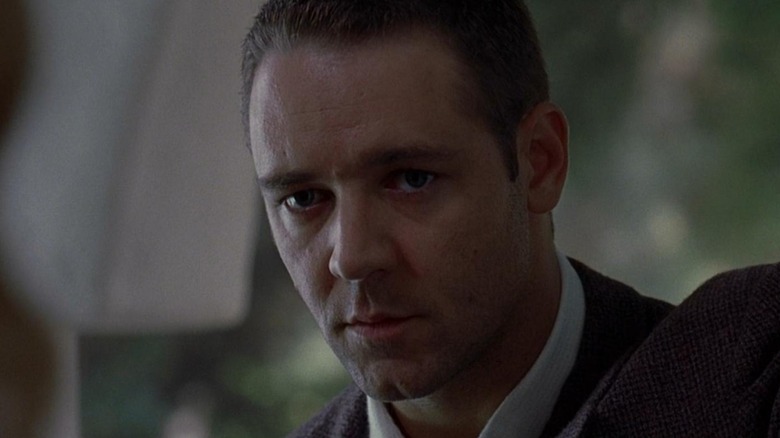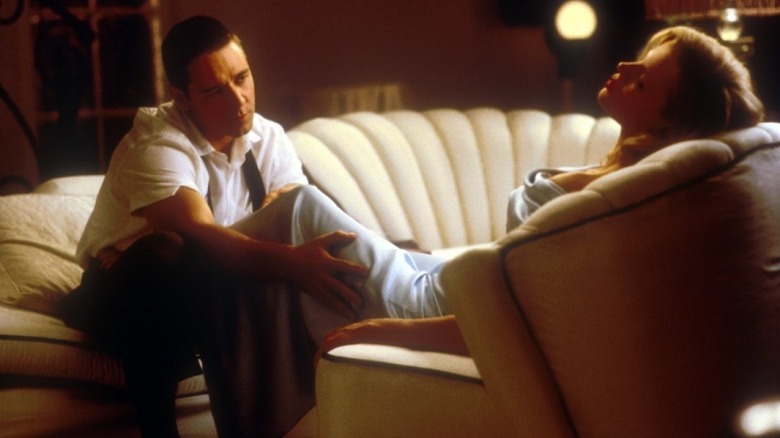Warner Bros. Tried To Mischievously Remove Russell Crowe From One Of His Best Roles
Curtis Hanson's crime drama "L.A. Confidential," based on the novel by James Ellroy, takes place in 1953 right after real-life crime boss Mickey Cohen had been arrested, creating a power vacuum in L.A.'s underworld. A mysterious and brutal massacre at a local diner — a massacre that took the lives of several allegedly corrupt cops — reveals a series of equally mysterious plots throughout the city, each of them being individually investigated by one of three cops. There is Edmund Exley (Guy Pearce), the by-the-book Boy Scout no one likes. There is Jack Vincennes (Kevin Spacey), the celebrity cop who offer consultations to the hottest cop show on TV. And there is Bud White (Russell Crowe), a human fist who instinctively beats up criminals who piss him off or who dare to threaten women in his presence.
"L.A. Confidential" is one of the best films of the 1990s, and provided audiences with one of Crowe's best performances, which is certainly saying something. That guy is always wholly devoted to a role, even when he's in schlock like "The Pope's Exorcist." It was also proof that Crowe was capable of handling high-profile Hollywood prestige fare. He had already gathered attention from critics for his tour de force performances in 1992's "Romper Stomper" and 1997's "Virtuosity." After "L.A. Confidential," he was more openly talked about in Awards conversations. He would later be nominated for three Best Actor Academy Awards.
Warner Bros., however, didn't want Crowe to appear in "L.A. Confidential." It seems that, to the studio, Crowe wasn't a big enough star, and his presence was a financial detriment. In a 2023 video interview with Vanity Fair, Crowe revealed the insidious techniques Warner Bros. employed to discourage him from playing Bud White.
Warner Bros. deliberately stopped playing for Russell Crowe's hotel
Notably, Warner Bros. deliberately stopped playing for Crowe's hotel, and they took away his transportation. It seems that Warner, by depriving him of these utilities, would force him to miss work. If he missed work, then Warner would have every right to fire him. He said:
"When I flew to L.A., I moved into this hotel and we began rehearsals. A few days into the rehearsals, the studio stopped paying the bill at the hotel, and they stopped paying for my rental car. The studio didn't want me to be in that role. They wanted, I think, Sean Penn and Robert De Niro in the film or something. Things that they could quantify and understand."
Luckily, Crowe was sneaky, and knew how to deal with a watchful manager. Not only would he be fired if he missed work, but it's likely if Warner received an angry phone call from Crowe's hotel, they would happily take that as a sign that Crowe was unreliable and fire him for that, too. It was truly a test of Crowe's cunning. He continued:
"There was probably a four- or five-day period there where I was leaving the hotel of a morning by going down the back stairs because I knew the manager of the hotel was waiting for me in the foyer to ask when the bill was going to be paid. If I paused and said, 'I'm not turning up to work,' they would have taken that opening to get me out of the movie."
During production, no one believed that "L.A. Confidential" would succeed. It wasn't until a producer personally carried a 35mm print to Cannes for official competition that the industry began to take the film seriously.
"L.A. Confidential" was nominated for nine Academy Awards.

